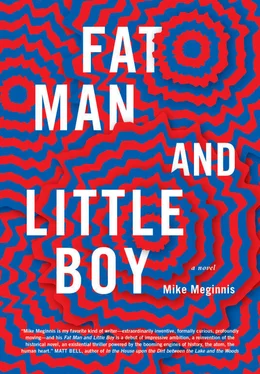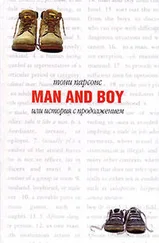“If Little Boy was near,” says Fat Man, “it would become a stream of marching fire ants as it left her body. They would walk down the blankets, off the bed, and out the door.”
“We understood she wasn’t going to get better,” says Little Boy. “I didn’t ask—I still wasn’t talking—but Fat Man said he wouldn’t take her to a doctor because he couldn’t afford to pay for the treatment. When she spent more of the day asleep than awake, when she stopped shivering, when she stopped scratching, when she no longer took any notice of the things that grew on her, we knew she would die soon. We gave her so many blankets and pillows. Well, he did. I watched him do it. I still wasn’t moving.
“There was a dim spark left in her when it started. We couldn’t get far enough away to stop the growth. At first it was mold. It covered her all over like a cocoon, green and white and black, the air around her thick with spores. We could see her moving a little inside it. Fat Man tried to peel it away from her, he tried to tear it open. It grew around his hands. He tore them out. It stuck to him, and grew, and grew. He scraped it off himself and backed away. It changed colors and the surface roiled with familiar shapes. They changed quickly. I thought I saw faces. So did Fat Man.
“We saw each other. We saw the police. We saw Rosie. We saw you. We saw my nurse. We sat to watch. It shed warmth on our faces.”
“She struggled then,” says Fat Man.
“As much as she could. For a moment one of her hands pierced the growth, grasping at the air, and it cast a talon shadow on the ceiling and another, paler shadow on the wall. Then it grew over. Her elbow collapsed inside the mold and her arm fell back in.”
“Her body tightened, curling inward,” says Fat Man. “A sound like a cicada, but more musical, came from inside as the body in there trembled and shook.”
“The mold gave way to maggots. She was beaded with the maggots, the same as the Japanese soldier’s body, and others. They squirmed out, and writhed on her, and then there were more, and then there were more, and as their bodies piled up they tried to eat more but already there were others eating through where they had eaten, emerging underneath them, and beneath those more, so the pile rose.
“Soon the maggots were like a fire and because the maggots were alive they could not eat each other or themselves. They did though begin to wilt as they heaped up near the ceiling, turning ashen and then shriveling inward, blackening, like cigarette ends, and crumbling into themselves.
“They would crumble, and come apart, and the ashes fell on the floor and the Jew things. When they burst they made a sound like fire spitting sparks. Their ashes fell and turned around the pile, revolving. At the base of the pile, where more were always coming out, pink and white and gray, becoming grayer, there was what was left of the tramp, some skin and muscle, a lot of bones. The maggots slowed as her flesh dwindled. The pile became a small, wavering flame, and then it was nothing. The air was hung with ash. My face was very warm. We were sweating. I took off my clothes. So did Fat Man. Our sweat dripped on the floor. The drops made big, shiny circles, at first separate, and then overlapping, growing a puddle.
“The light came from in the bones, or between them, a glow, which was rich and thick inside, and thinned as it bled out on us.”
“The bones grew flowers,” says Fat Man.
“White ones, red ones, yellow, budding from the bones themselves—no stems, at first. Lilies and daisies, roses, even dandelions, only the blooms, opening all over the bones, spitting pollen up among the ashes. Then stems grew from between the blooms, and these came to flowers, and stems grew from among them, and these became flowers, and grass grew out between the blooms, and clover grew. These too took a shape like a fire, and as they rose and swelled they seemed to burn, and the warmth grew warmer. The light from inside it grew brighter.
“A smell like wet grass clippings wafted. It was also like a dog’s breath. It was a hot smell as much as it was a green one. It was alive as it was dead. With everything that grew from the body we felt more calm, and as each one extinguished, calmer still. The weight came off me. My heart cooled,” says Little Boy.
“All the flowers, grass and clover, everything, twisted into one fat stem, thick as a torso, stained with all the colors of the flowers in green shapes like burns through paper. As its center twisted tightest the stem’s top twisted outward, loose, and this made the bed of a very large red rose with some orange petals and some blue swirled inside it, growing and growing until it crushed the stem.”
“Thousands of little baby spiders crawled out,” says Fat Man.
“They crawled out and down the bed and over the Jew things, growing as they walked, and when they came to us they were large and bristling with hairs, which grew to inches long. They walked up on us and became fat, then died and fell away. The flowers wilted and turned brown, like a kernel or a shell. The spiders stopped coming and the shell wrinkled and closed in all around her.”
Fat Man said, “She’s becoming a seed.”
Little Boy said, “We should take her outside.”
“What do you think she’ll become?”
They didn’t know. They decided to plant her. They laid her on the ground. The seed had a knot at its center that looked like a person. A person curled up.
Fat Man said, “You did this to her!”
“No I didn’t.”
“Yes you did, you did this, you killed her.”
Little Boy punched Fat Man in his knee. Fat Man fell on him on purpose. Little Boy bit Fat Man’s cheek. Fat Man barked and punched Little Boy’s head. They kicked and kneed one another. Fat Man was smothering Little Boy with his bulk. Little Boy couldn’t breathe. Little Boy passed out.
When Little Boy woke, the fat man was lifting him up on his shoulders. Little Boy sat still; he didn’t want to hurt his brother anymore. He wanted to be good. They watched the tree grow. It came up from the ground very fast. Fat Man apologized.
He said, “Not just for this. For everything.”
Little Boy said, “I love you so much.”
Fat Man said, “I love you too.”
“I told you you could be a good speaker,” says Fat Man. He twists out his cigarette in an ashtray surrounded by empty liquor bottles. There are a dozen butts, some very old, lining the edge of the tray, their ash ends collapsed into a pile. The orange bits of his own cigarette burn out quickly.
Little Boy shrugs. “Throat hurts.”
“You exhausted the ghosts,” says Masumi. “I see how it was now. They were molds, then maggots, then flowers, then spiders, and so on. Most gave up on following you after that. Many of the rest helped make a tree. There are only a few left.”
“What do you think it’s like being a tree?” asks Fat Man.
“I don’t think it’s like much of anything,” says Masumi. “Which makes it very close to nirvana.”
“They still come to us, if we wait long enough. If I touch the wick of a candle and wait, there will be fire. If I am careless in my eating, the food will rot. When I’m agitated, it can be as bad as it ever was. I want them to leave me alone,” says Fat Man. “You could still kill me. I wouldn’t mind very much as long as you don’t hurt Little Boy.”
Little Boy yawns and pours himself another drink. His eyes are red from the late hour, the cigarettes and booze. “Can we go home soon?”
“I would sooner kill him than you,” says Masumi. “At least you know what you’ve done. You’ve got to live with it. What’s he got to live with?”
“Self-imposed stupidity,” says Fat Man.
Читать дальше












